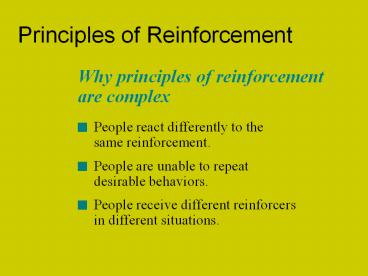Principles of Reinforcement - PowerPoint PPT Presentation
1 / 14
Title:
Principles of Reinforcement
Description:
Focuses on punishing undesirable behaviors, which should lead to future ... Punishment can control and change behavior but 80 to 90% of reinforcement should ... – PowerPoint PPT presentation
Number of Views:141
Avg rating:3.0/5.0
Title: Principles of Reinforcement
1
Principles of Reinforcement
Why principles of reinforcement are complex
People react differently to the same
reinforcement.
People are unable to repeat desirable behaviors.
People receive different reinforcers in
different situations.
2
Approaches to Influencing Behavior
Positiveapproach
Focuses on rewarding appropriate behavior, which
increases the likelihood of desirable responses
occurring in the future.
Negativeapproach
Focuses on punishing undesirable behaviors, which
should lead to future redirection of these
inappropriate behaviors.
3
Approaches to Influencing Behavior
Most coaches and instructors combine positive and
negative approaches.
Sport psychologists agree that the predominant
approach with physical activity and sport
participants should be positive because the
negative approach often instills fear in
participants.
4
Positive Reinforcement
1.
Choose effective reinforcers (e.g., social
material, activity).
2.
Timing or schedule of reinforcement.
Early learningcontinuous and immediate
reinforcement desirable
Learned skillintermittent and immediate
reinforcement desirable
3.
Shape or reinforce successful approximations of
difficult behaviors.
4.
Reward performance, as well as outcome.
(continued)
5
5.
Reward effort.
6.
Reward emotional and social skill.
7.
Provide knowledge of results (feedback regarding
the correctnessor incorrectness of an action).
8.
Provide motivational and instructional feedback.
6
Punishment
Punishment can control and change behavior but 80
to 90 of reinforcement should be positive.
Drawbacks of punishment
Punishment can arouse fear of failure.
Punishment can act as a reinforcer.
Punishment can hinder learning of skills.
7
Modifying Behavior in Sport
Behavior modification
Systematic application of the basic principles
of reinforcement to change behavior.
8
Modifying Behavior in Sport Rehab. Settings
Behavior program principles
Target the behaviors define targeted behaviors
record behaviors provide meaningful feedback
state outcomes clearly tailor reward systems.
9
Intrinsic Motivation and Extrinsic Rewards
Intrinsic motivation Striving inwardly to be
competent and self-determining.
Basic question Do extrinsic rewards undermine
intrinsic motivation?
Research shows that being paid for working on an
intrinsically interesting activity can decrease a
persons intrinsic motivation for the activity.
10
Intrinsic Motivation and Extrinsic Rewards
Cognitive EvaluationTheory
How rewards are perceived is critical in
determining whether intrinsic motivation
increases or decreases.
11
Cognitive Evaluation Theory
Controlling aspects Rewards that are perceived
to control a person or suggest the person is not
competent decrease intrinsic motivation.
Informational aspects Rewards that increase the
information aspect and provide positive feedback
about competence increase intrinsic motivation.
12
How Extrinsic Rewards Affect Intrinsic Motivation
in Sport
Competitive success and failure Competitive
success increases intrinsic motivation, whereas
competitive failure tends to decrease intrinsic
motivation.
Feedback Positive feedback increases intrinsic
motivation.
13
Increasing Intrinsic Motivation
Provide for successful experiences.
Give rewards contingent on performance.
Use verbal and nonverbal praise.
Vary content and sequence practice drills.
14
What types of things can you do as an athletic
trainer that can help the motivation of athletes
in the rehabilitation process?































